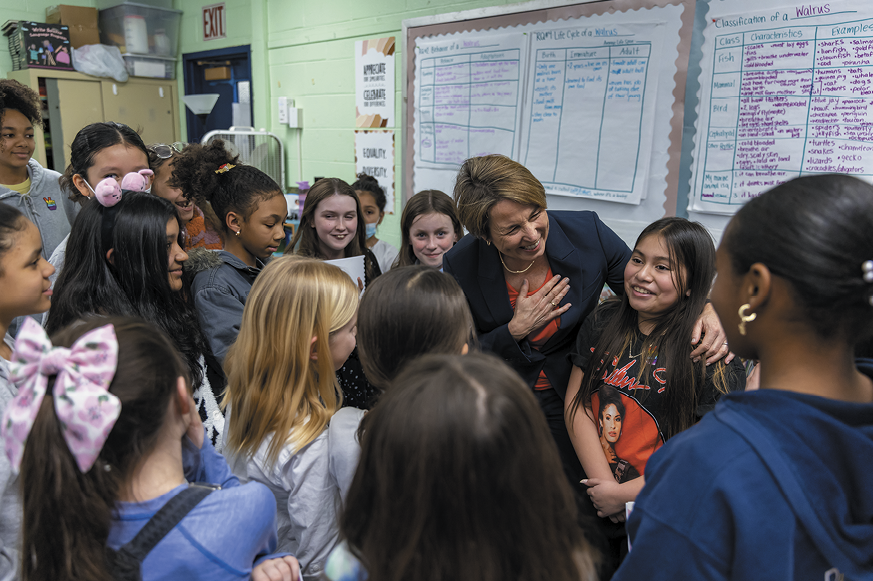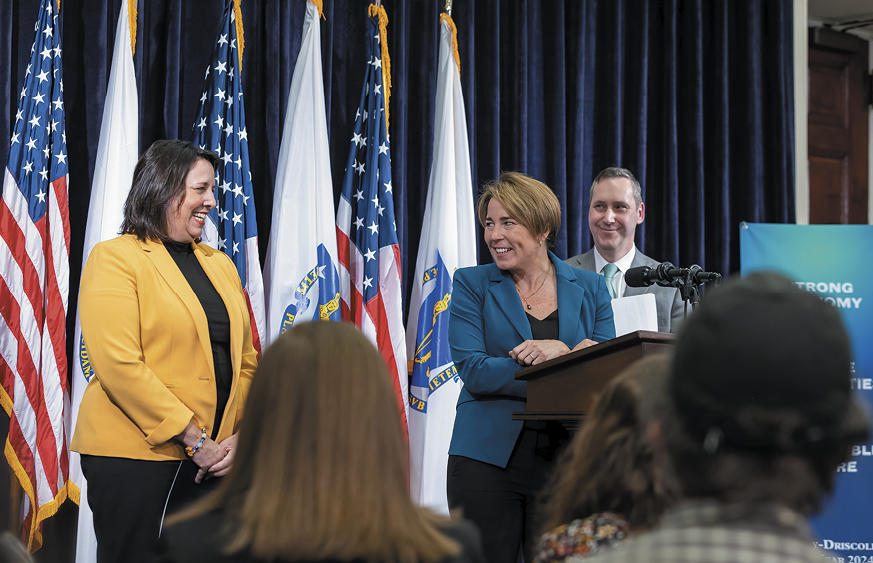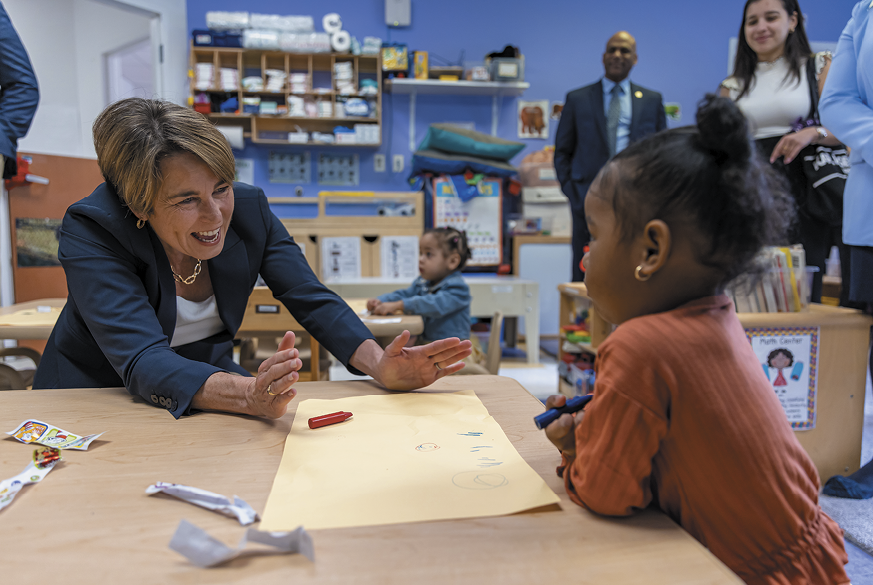- Home
- Media Kit
- MediaJet
- Current Issue
- Past Issues
- Ad Specs-Submission
- Reprints (PDF)
- Photo Specifications (PDF)
- Contact Us
- PRIVACY POLICY
- TERMS OF USE
![]()
ONLINE
![]()
ONLINE

Team Massachusetts
Editors’ Note
Maura Healey is the 73rd Governor of Massachusetts. She was sworn in on January 5, 2023, becoming the first woman and first openly LGBTQ+ person elected Governor in Massachusetts history. Healey was elected Massachusetts Attorney General in 2014 and re-elected in 2018. Building on her promise to run an office that serves people across the state, Healey launched the Community Engagement Division in May 2015. The first-of-its-kind division brought the Attorney General’s Office and its work into neighborhoods and communities across the state. She went on to work in private practice before leaving to serve as Chief of the Civil Rights Division in the Attorney General’s Office. She was promoted to oversee two of the office’s most prominent divisions: the Public Protection and Advocacy Bureau and the Business and Labor Bureau. During this time, she led the first state challenge to the Defense of Marriage Act and held banks and lending companies accountable after the 2008 financial crisis. Healey attended Harvard College, where she captained the basketball team, and then spent two years as a 5’4” starting point guard on a professional basketball team in Austria. She attended Northeastern University School of Law, motivated by a commitment to public service and desire to help people.

Governor Healey celebrates International Women’s Day
with girls at the Hurley School
Where did your interest in public service develop?
My parents were very active in their communities. My mother was a school nurse and a health educator. My father worked at the Environmental Protection Agency as an engineer. My step-father was a high school history teacher and coach. From all of them I learned about the importance of community and involvement in public issues. I never planned to run for office when I was younger, but I always was interested in what was happening in the public. Later in my legal career, I decided to leave my law practice and join the Attorney General’s office. That’s where I saw the power of public service and action up close, and being a part of that led me to run for Attorney General and later on for Governor.
Will you highlight your administration’s Capital Investment Plan to build a more affordable, competitive, and equitable future for Massachusetts?
Our Capital Investment Plan is a five-year, $14 billion investment that is designed to make Massachusetts more affordable, competitive, and equitable for everyone. It’s our blueprint for what we hope to accomplish. It intentionally includes major investments that meet the needs of everyone in our state from the Cape to the Berkshires. Its implementation will tackle the ongoing climate crisis by strengthening communities, creating good jobs through statewide economic development, and help more people afford to live, work and raise families in our state.
One of the hallmarks of our Capital Investment Plan is an investment of $1.5 billion for housing initiatives. We created a new pioneering program called HousingWorks, which will support the construction of hundreds of new, affordable housing opportunities each year. We’re also investing $1.4 billion in the state’s transportation systems to reduce emissions through electrification, create more sustainable modes of transportation, and build resilient infrastructure prepared to withstand the impacts of a changing climate. Over five years, the plan also includes over $1.6 billion to fund more than 40 state building decarbonization projects.
And that’s only part of it. Each and every one of the investments included in this plan is focused on strengthening opportunity, quality of life, and equity in our state. This plan will bring Massachusetts forward with the resources and creativity our entire administration had to offer, and we’re really excited about it.

Healey-Driscoll Administration files Fiscal Year 2024 budget
which included tax relief and creation of the Executive Office
of Housing and Livable Communities
How is your administration addressing the state’s climate goals in terms of decarbonization and climate-conscious investments?
We know how important it is to be aggressive in our approach to solving the climate crisis. We see this as our greatest existential threat, but also our greatest opportunity for growing the economy and building healthier communities. A crisis of this magnitude is bigger than any one agency. That’s why I appointed the nation’s first state Climate Chief, Melissa Hoffer, to drive our all-of-government strategy. She works across agencies to drive down emissions, make our communities more resilient, and embed climate priorities into the DNA of every state agency. Her work has already started to make a difference. For example, we recently launched the Massachusetts Community Climate Bank, which is the nation’s first green bank dedicated to affordable housing.
Earlier this year, we announced $50 million in decarbonization grants for low- and moderate-income housing. I also proposed and signed into law an investment of 1 percent of our state budget to our energy and the environment agency for the first time ever. That includes $30 million for the Massachusetts Clean Energy Center to support wind technology, clean homes, and workforce training programs in the clean energy industry, and $4.8 million for a decarbonization clearinghouse for energy efficiency, electrification, and storage. To increase our clean energy sources, we filed a draft RFP for the largest offshore wind solicitation in Massachusetts history, launched a commission dedicated to ensuring equitable and effective siting of clean energy, and developed a map of every possible parcel suitable for hosting solar. Throughout all of this work, environmental justice will be key. We have an opportunity to right past wrongs. To accomplish this, we are also staffing up all of these agencies with a new position specifically dedicated to environmental justice, equity, and outreach.

Governor Healey commemorates 10th anniversary of the
Boston Marathon bombing, watches B.A.A. 5K
Will you discuss your administration’s focus on improving education in Massachusetts and reforming K-12 education?
The first free public school in America was established in our state almost 400 years ago and public education has been guaranteed ever since. Today, we need an equal guarantee for our children – that we will continue to offer not just an education, but the best education. That’s why our FY24 budget includes:
• The largest dollar-amount increase in K-12 education funding ever in our state’s history, including fully funding the Student Opportunity Act.
• $172 million in permanent funding to provide universal school meals for public school K-12 students.
• The creation of MassReconnect – our free community college program for students over 25 without a degree – along with funding for early college and career opportunities, apprenticeships, job training, and more pathways into good jobs in the new economy.
• $46.4 million for Early College and Innovation Career Pathways to help connect students with applied, hands-on work experience and an opportunity to find their passions.
• More resources to address the growing behavioral health needs of our schools and their communities.
I also believe that education starts before kindergarten, and that’s why we’ve made historic investments in early education and care. Our budget includes $475 million for childcare providers through the Commonwealth Cares for Children grants and $71 million to increase childcare slots for income-eligible families and put us on a path to universal Pre-K.
We’ve also recently proposed an updated draft of the comprehensive health and physical education curriculum framework to the Board of Elementary and Secondary Education. The LGBTQ+ inclusive, medically accurate and developmentally – and age-appropriate framework outlines guidelines for health and physical education for PreK-12 public school students in Massachusetts and would revise DESE’s existing Comprehensive Health Curriculum Framework, which was last updated in 1999.

Governor Healey visits Community Day Early Learning Center
in Lawrence
How is your administration addressing the issue of food security and resilience across Massachusetts?
Food security is essential for the health and well-being of our students, which is why we delivered $171 million for universal school lunch in our first budget. Aligned with our goals to stabilize, heal, and transform our education system, this funding will ensure that students can focus on their classes in school, instead of where their next meal is coming from.
Earlier this year, we were also proud to be the only state in the nation to provide a three-month off-ramp when the federal government ended expanded SNAP benefits. This program gave families 40 percent of their previous federal benefit to help soften the transition.
We recently awarded over $26.3 million in grants to strengthen Massachusetts’ food supply system and mitigate future food supply and distribution disruption issues. This will fund 165 projects through the Food Security Infrastructure Grant (FSIG) Program. FSIG was created to combat urgent food insecurity resulting from the COVID-19 pandemic. Our budget also makes this program permanent for the first time so that our farmers, food banks, and other food supply chain organizations can count on this funding in the years to come. The Lieutenant Governor and I spent weeks traveling around the state after the summer floods assessing damage at farms and discussing recovery and mitigation efforts. The FSIG program is designed to ensure farmers and other local food producers are better connected to a strong and resilient food system. For the first time in the history of this program, we prioritized projects that support organizations impacted by drought or extreme weather events.
How critical is a strong public-private partnership in Massachusetts and will you highlight your working relationship with the business community?
I am a strong believer in the power of public-private partnerships and working together with our local businesses to move Massachusetts forward. Our administration is committed to partnering with businesses to lengthen our lead across industries like clean energy, medical innovation, and education. This is essential to keeping Massachusetts competitive.
We depend on our business leaders for creating jobs, supporting tax revenues, and investing in our communities. They are also our direct connection to learning about what our local economies need. Every business owner and CEO we talk to has a story to tell about the challenges of finding, attracting, and retaining talent; about the impact of high housing costs on employees and hiring; about the need for reliable public transit – and we are committed to addressing all of these issues.
It is why we launched MassTalent, an initiative to streamline job trainings throughout the Commonwealth to help employers find skilled employees here in Massachusetts. We also created MassReconnect, which funds free community college for people over the age of 25-years-old to help jump over hurdles and strengthen our workforce.
We are committed to building and sustaining a competitive business climate in Massachusetts. Our vision is a state where everyone can build a life, grow a business, and thrive. We are a leader in key innovation sectors, and on many quality-of-life issues and public services. But this is no time to rest on our laurels. We want to lengthen our lead, and we can only do that by working and competing together to meet this moment.
As you look to attract new industries and businesses to Massachusetts, how do you define the Massachusetts advantage?
Massachusetts is an amazing place to live, work, start a business, grow a family, and build a future. We’re home to world-renowned healthcare, research and educational institutions, and a vibrant arts and culture sector. We’re on the cutting edge of life sciences, clean energy, business, and innovation. This is a legacy of greatness – we’re the birthplace of the first state constitution, the first public school, the first public library, and marriage equality. And importantly, we’re going to protect freedom and civil rights. This is part of our competitiveness. Employees and customers alike want to know that their elected leaders have their backs and that they can be their true, authentic selves without fear. That’s the Massachusetts advantage.
With so much gridlock and partisanship in Washington, DC, what do you feel are the key ingredients in getting action and achieving results?
I’m proud that the Biden-Harris Administration, with strong support from the Massachusetts Congressional delegation, has delivered historic investments in infrastructure, life sciences, internet access, and much more. President Biden has led historic bipartisan victories that have allowed Massachusetts to compete for federal dollars that we can use to improve our state. In an effort to build on our relationship with the federal government and ensure that we have direct connection to our partners in DC, I created a Director of Federal Funds and Infrastructure. This allows us to meet the moment that we’re in as a nation and achieve tangible results for the people who live, work, and enjoy Massachusetts. For example, we are about to submit a $1.45 billion application for federal infrastructure funds to support construction of two crucial bridges connecting the rest of the state with Cape Cod.
What do you see as the keys to effective leadership and how do you describe your management style?
As a lifelong athlete, Team Massachusetts has been my favorite team yet – all of us working together to help deliver on our goals of making our state more affordable, competitive, and equitable. One of the virtues I’ve held onto over the years is my commitment to teamwork and collaboration – from the basketball court to the courtroom and now the corner office.
What are your thoughts on being the first woman and first openly LGBTQ+ person elected Governor in Massachusetts history?
I’m proud to be the first woman and the first LGBTQ+ person to be Governor of Massachusetts. I’m also proud to be a part of one of the first all-women Executive Office teams in the nation with our Lieutenant Governor, Kim Driscoll. And we know we won’t be the last. Representation matters. Seeing is believing. When we have more people in leadership positions who reflect the people we serve, we get better policies and better laws and better work done. My hope is that we can inspire other young girls and LGBTQ+ people and show them that they can do anything they set their minds to. See it, believe it, be it!![]()